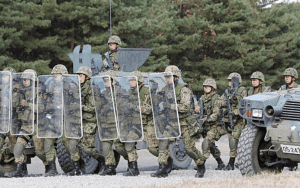Sociologist Herbert Spencer Differentiated Between, Two Kinds of Society, And Those who Passionately Support Each.
 Philosophy professor Herbert Spencer (1820-1903)described the society as two kinds of society. Herbert Spencer’s sociology of the state centered on the contrast between “militant” and “industrial” forms of social organization
Philosophy professor Herbert Spencer (1820-1903)described the society as two kinds of society. Herbert Spencer’s sociology of the state centered on the contrast between “militant” and “industrial” forms of social organization
Sociology’s Debt to Herbert Spencer’s Work
Two Kinds of Society, one of the most widely debated Victorian-era English intellectuals was Herbert Spencer. Along with Émile Durkheim and Talcott Parsons, he was one of the three most consequential structural-functionalist philosophers in sociology.
Structural functionalists held that institutions in society each served a necessary purpose for that society to function as a whole. They insisted that society’s institutions and structures were interdependent on one another for them to function correctly.
Spencer, whose training was in the natural sciences, applied that method of inquiry to concerns of philosophy and sociology. The theological worldview that he saw as universally accepted in the Middle Ages was something he believed philosophy was meant to replace.
Spencer’s groundbreaking scientific method in philosophy and sociology. However, his approach to sociology has evolved into the social and cultural anthropology field.
Despite his empirical method, Herbert Spencer was criticized by many sociologists for being a highly speculative thinker who created grand concepts and sought out evidence that supported them while dismissing the evidence to the contrary. According to Aldous Huxley, an English writer and philosopher, Spencer defined tragedy as “the slaying of a beautiful idea by an ugly fact” (1911).
Two Kinds of Society.”
He said there were essentially only two distinct types of civilizations: those based on warfare and those based on industry.
Comparatively, cooperation between individuals and organizations was voluntary and spontaneous in industrial civilizations. Still, in military cultures, it was secured by force. To illustrate his categorization, he used a contrast between despotism and individualism. He said despotism was uncivilized and terrible, whereas individualism was modern and excellent. His later writings reflected this philosophy.
A despotist regime is one in which one person or group holds ultimate authority and controls using cruelty and oppression. A dictatorship is typically headed by a single person, the tyrant. Despotic societies are those where the government restricts citizens’ ability to participate in decision-making and vote.
Herbert Spencer’s sociology of the state centered on the contrast between “militant” and “industrial” forms of social organization. The following quotation exemplifies his observation that the former type of society is closely related to violent activity and economic protectionism.
This means that a “not to be dependent on foreigners” attitude aligns more with a militaristic society. Keeping the ability to produce necessities at home and the necessary infrastructures in place is crucial so long as there is a risk that supplies from other countries will be disrupted due to the outbreak of hostilities. That’s why it’s so clear that militancy and protectionism go hand in hand.
During and during the Napoleonic Wars, several classical liberal writers appeared who, like Spencer, differentiated between “militant” and “industrial” forms of society. Frédéric Bastiat, Benjamin Constant, Jean-Baptiste Say, Charles Comte, Charles Dunoyer, and Charles Dunoyer were among these thinkers.
Some of the most influential economists in history, including Ludwig von Mises and many members of the Austrian school, were heavily influenced by this theory, which Herbert Spencer made a cornerstone of his sociology.
The Man Against the State,


In his book The Man Against the State, published in 1884, Herbert Spencer defined “militancy” as a system of mandatory cooperation.
He argued that a conscript army exemplified the “typical structure” of a militaristic society.
For a recruit to be successful, they must “carry out orders or die trying.
Going AWOL is out of the question because deserters are also typically executed.
Economics In One Lesson; An Introduction To The Henry Hazlitt’s Books, And Education Part 2
Herbert Spencer; Régime of Status,”
DiWputes over “who compels whom” could quickly escalate into an all-out war if there wasn’t a transparent chain of command to coordinate mandatory cooperation.
Militant societies are defined by the “régime of status,” which was “almost universal in ancient days.”
According to the Herbert Spencer’s definition, industrialism is a cooperative work method.
Spencer defined a business as The producers of goods who pay for services provided to them and may, if they noticed and disliked them, leave the organization, which is a good description of the private enterprise typical of an industrial society.
This means that employers and workers have the right to form and leave organizations at will.
Promoting Parental Involvement: A #BTColumn
Contracts
Agreements are the medium through which voluntary cooperation is carried out (contracts).
That’s why we can define modern industrial societies by “the régime of contract, which has become general in modern times, particularly among ourselves [the British] and the Americans.”
In a company, the organizational chart may be used to delineate a pecking order of importance. It’s also possible for superiors to issue directives to their subordinates.
In the end, it is up to the employee to comply with such directives, making obedience non-mandatory. Accordingly, a private company is founded on contracts rather than legal standing.
Impact Of Social Media On Education
Political History of Britain
Spencer argues that the political history of Britain during the 17th, 18th, and 19th centuries can be summed up as a struggle between two competing ideals for the country.
Those who wanted to make the Kingdom a militaristic hierarchy for all citizens were on one side.
Opponents included those who sought to transform the United States into a contractual, free-market economy.
Herbert Spencer Divided the History of British Political Parties Into Two Camps.


A letter he penned in 1823 reads: ” “The Whig and Tory parties represent the interests of the people.
It doesn’t matter what you call them in your country—whether it’s “Ultras,” “Radicals,” “Serviles,” or “Liberals”—these groups exist everywhere. The sickly, weak, and timid man is naturally Tory because he fears the people.
The robust and fearless person values them and is shaped into a Whig.
Here You Will Find 2023 Online Business Ideas.
However, this does not mean that one country’s two major political parties are necessarily “militant” and the other “industrial.”
In many groups, genuine believers in voluntary cooperation are a small minority.
The major contending “parties” are, in fact, competing branches of the same “militant” party, with different departments advocating different forms of coercive consensus.
Learn Happy Healthy Life Tips; These 5 Lifestyle Trends Will Be Huge In 2023
Nearly Everyone Claims to Support a Free-Market Democracy.
Only those who advocate for cooperative efforts based on mutually beneficial agreements can be considered true advocates.
People who, like socialists, claim to promote “freedom” by imposing compulsory cooperation (mandating behavior, confiscating earnings, nationalizing industries, conscripting labor, etc.) make society more violent, primitive, regimented, hierarchical, and less accessible.
For more information click here,




